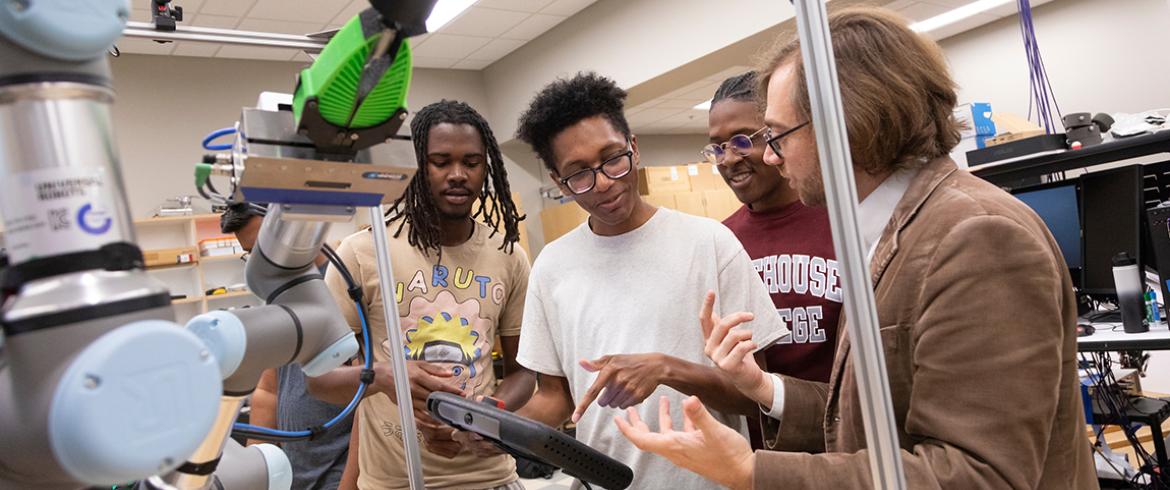
Dr. Dwayne Joseph and his students from Morehouse College, an HBCU in Atlanta, GA, visit Dr. Christian Hubicki’s lab in the Center for Intelligent, Systems, Control, and Robotics (CISCOR) in the Aero-propulsion, Mechatronics, and Energy Center (AME) of FAMU-FSU College of Engineering in Tallahassee, Florida on June 27, 2024. (Scott Holstein/FAMU-FSU College of Engineering)
When FAMU-FSU mechanical engineering professor Christian Hubicki and Morehouse College physics professor Dwayne Joseph from joined forces, their aim was to broaden the scope of robotic education at historically Black colleges and universities (HBCUs) through an exciting summer course.
They met while participating in a distributed teaching collaborative involving several institutions that share access to robotics coursework. The summer course is designed to provide a rapid introduction to advanced robotics algorithms, a course not commonly offered at the undergraduate level. The three-week class welcomes students from multicultural backgrounds, including physics majors and individuals with coding expertise, to the world of robotics.
“For the past two years, I have spearheaded the joint college’s involvement in a robotics distributed teaching venture spanning multiple universities,” Hubicki explained. “When I connected with Dr. Joseph, his students demonstrated a keen interest, prompting us to conceive the idea of a short summer course where students could engage with a tangible and practical experience.”

Joseph is also enthusiastic about the course. “I see a future in which more individuals of color, more minorities and more students at minority-serving institutions pursue careers in robotics and machine learning, and programs like this serve as an exceptional catalyst to ignite their initial interest.”
In addition to the short summer course, extended courses are available in the fall and spring semesters. The robotics teaching collaborative gives students at the FAMU-FSU College of Engineering and partnering universities the chance to enroll in online classes not available at their home institutions.
The consortium includes Morehouse College, Howard University, Berea College, the University of Michigan and the FAMU-FSU College of Engineering.
Winston Doss, an undergraduate computer science student at Morehouse, is actively involved in the remote summer course. Doss traveled to Tallahassee with fellow Morehouse and Kennesaw State students to get hands-on robotics exposure. Three additional students from LaGuardia Technical College are participating remotely.
All the students used mathematical algorithms to direct a robot arm performing a physical task.
“Today we are using math concepts to get our robot arm to work,” Doss said. “I just need to make sure my simulation runs. Once that runs, I can try it on the robot and see how it correlates.”
All this hands-on practice helps in the classroom, as well.
“This class helped show me how math applied to the real world, especially when it comes to robots,” Doss said. “The concepts became much simpler when using the different formulas for real-world applications.”
“The students here are getting a head start; they are learning the material and actively applying the knowledge presented to them,” Hubicki said. “My hope is to give access to students from other universities, including HBCUs and provide them with a seamless transition into a career in robotics.”
Funding for the initiative is supported by $760,000 in grants from the Toyota Research Institute (TRI) and Ford Motor Company and $150,000 grant from the Alfred P. Sloan Foundation. Their support has been pivotal in bolstering the endeavors of the college to integrate broader HBCU teaching into the robotics program.
RELATED ARTICLES
State-of-the-art robotics lab announces two advancements in biologically-inspired movement research
L3Harris Technologies Honors Engineering Professors for Their Work with Bomb-Defusing Robotics
Engineering professors honored at NAE “Frontiers of Engineering” Symposium
